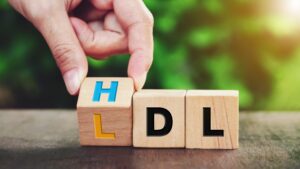February 21, 2024
Are you curious about how fasting affects cholesterol levels? Fasting, especially intermittent fasting, is a topic of much interest in the health community. At Healthcare Associates of Texas, we understand your concerns and are here to offer clear, reliable insights. Let’s explore its potential impact on your cholesterol.
Understanding cholesterol
Cholesterol might sound complex, but it’s just a type of fat in your body that’s important for your health. Let’s break it down into simpler terms.
What is cholesterol?
Cholesterol is like a waxy substance in your blood. Your body needs it to make things like hormones and vitamin D. It also helps to maintain cell wall structure. Cholesterol comes from two sources- the food you eat and your liver. Your liver makes all the cholesterol your body needs to stay healthy.1
 Good and bad cholesterol
Good and bad cholesterol
HDL (high-density lipoprotein): HDL is a good type of cholesterol. Think of it as a helpful friend in your bloodstream. It carries cholesterol to your liver. Your liver removes it from your body. Having more HDL is a good thing because it lowers your risk of heart disease.2
LDL (low-density lipoprotein): LDL is the not-so-good type of cholesterol. If you have too much of it, it can stick to the walls of your blood vessels and make them narrow. This can cause problems like heart disease and stroke. So, you want to keep your LDL levels low. The American Heart Association (AHA) recommends levels at or below 100.³
Why balance is important
Having the right balance between HDL and LDL is key. You need some LDL, but not too much. And you want more HDL to keep your heart healthy. Doctors look at both types of cholesterol to see if your heart is at risk.⁴
Don’t forget triglycerides
Triglycerides are another fat in your blood. Like cholesterol, you need some, but not too much. High levels of triglycerides, especially with low HDL or high LDL, can increase your risk for heart problems.⁵
By understanding these basics about cholesterol, you can be more aware of your heart health. It’s all about keeping these fats balanced.
The effect of fasting on cholesterol
Have you ever wondered whether taking a break from eating could help lower cholesterol? The answer isn’t a simple ‘yes’ or ‘no.’ The impact of fasting, particularly intermittent fasting, on our health and specifically on cholesterol levels is an area of ongoing research with some encouraging findings.
What does the research say?
In one study, participants with metabolic syndrome taking blood pressure and cholesterol drugs were asked to limit their eating to a 10-hour window each day, picking their eating times consistently. Remarkably, after following this routine for three months, these individuals saw a decrease in their bad cholesterol (LDL) levels and experienced other significant health improvements.7
Several other studies looked at the effects of fasting on cholesterol levels. Each has promising findings. Regular fasting, such as fasting for 12 hours a day, three times a week over six weeks, has been shown to decrease bad LDL cholesterol and increase good HDL cholesterol. However, this study only observed a small group, suggesting the need for further research across a broader population to confirm these effects.8
Additionally, a 2015 review paper found that alternate-day fasting over 3–12 weeks significantly reduced total cholesterol by 10–21% and triglycerides by 14–42%. Longer trials lasting 12–24 weeks lowered total cholesterol with comparable results. It’s worth noting that these studies had varying definitions of fasting. Furthermore, the optimal duration for fasting to achieve these benefits has not been established, indicating an area for future research.9
Different research studies show that various kinds of fasting can positively affect cholesterol levels. We still need to learn more about the details, but both fasting and intermittent fasting bring many health benefits, like helping lower cholesterol.
Understanding fasting: what it means
Fasting has been around for centuries. For some, it is a common practice during major religious holidays. Fasting is when you decide not to eat for a certain amount of time. Think of it like pressing the pause button on eating. When you fast, you don’t eat anything for a while—this could be for many hours, a whole day, or even longer. During this time, you usually drink water or clear liquids.6
Reasons people fast
- For health: Some people fast to help their body rest or to lose weight.
- For religion: In some religions, like Islam and Judaism, fasting is part of special holidays.
- Before medical tests: Doctors might ask you to fast before certain tests.
Intermittent fasting: A different way of fasting
Intermittent fasting is different from regular fasting. Instead of not eating for a long time, you have a schedule for when you eat and when you don’t. It’s like having eating times and non-eating times. This type of fasting is about planning out your day or week for eating and not eating.
 How intermittent fasting works
How intermittent fasting works
There are lots of ways to do intermittent fasting. It’s okay if it takes a while to get used to longer periods of not eating. The great part about intermittent fasting is that you can adjust it to fit what works best for you. Intermittent fasting affects cholesterol levels because it changes your metabolism from glucose to ketones. This is when your body starts to use lipids instead of storing them. A few common intermittent fasting methods are:
The 16:8 method: This is when you don’t eat for 16 hours and then eat only during an 8-hour period. For example, you might eat from 10 a.m. to 6 p.m. and then not eat for the rest of the day.
The 5:2 method: Here, you eat normally five days a week, but for two days, you eat very little, like 500-600 calories. The days you limit your calories are usually set each week.
Why do people intermittently fast?
People might choose intermittent fasting for different reasons. Some do it to lose weight, some for their health, and others because it simplifies their daily routine. It’s not about changing what you eat, only the timeframe in which you eat.
So, fasting is taking a break from eating; intermittent fasting is more like a schedule for eating and not eating. Both are ways people try to stay healthy, but they do it in different ways.
 How long should you fast?
How long should you fast?
You might wonder, “How long do I have to fast to start seeing benefits?” Well, it varies from person to person. To start feeling the benefits of fasting, you should aim for at least 12 hours daily. That’s about how long it takes your body to switch from using sugar (glucose) for energy to using fat. Also, remember that your body needs time to adjust to this new eating pattern. Generally, you may notice changes or results within two to four weeks.
Fasting isn’t about doing it once or twice. You must make fasting a consistent part of your life to benefit from it.³
Eating healthy is important too
Also, remember what you eat during your eating times is important. Just because you’re fasting doesn’t mean you can eat lots of unhealthy food. Eating healthy things like fruits, veggies, whole grains, and lean proteins is still important.
Who should avoid intermittent fasting?
Intermittent fasting is generally not recommended for people who:10
- Are underweight
- Have a history of eating disorders
- Are pregnant or breastfeeding
- Take medication for diabetes
- Experience low blood sugar (hypoglycemia)
- Under the age of 18
When it’s time to see a doctor
Taking care of your cholesterol is necessary for your health. If you’re thinking about fasting to help with your cholesterol, it’s a good idea to talk to a doctor first. Fasting, like intermittent fasting, helps with cholesterol, but it’s not right for everyone.
If you have high cholesterol, your doctor can advise you on how to lower it. They might tell you to change your diet or increase physical activity. They may even prescribe medication to help lower your cholesterol.
Make an appointment with Healthcare Associates of Texas if you have any questions about fasting, cholesterol, or anything else about your health. They can help with all your health-related needs.
Learning about cholesterol and contemplating fasting are excellent first steps toward better health. Remember that healthy eating and getting regular check-ups are also essential!
References
- “What is Blood Cholesterol?” National Heart, Lung, and Blood Institute. N.D. Last modified March 24, 2022. https://www.nhlbi.nih.gov/health/blood-cholesterol
- “What is Cholesterol?” American Heart Association. N.D. Last modified November 6, 2020.https://www.heart.org/en/health-topics/cholesterol/about-cholesterol
- “LDL and HDL Cholesterol and Triglycerides. Centers for Disease Control and Prevention. N.D. Last modified May 16, 2023.https://www.cdc.gov/cholesterol/ldl_hdl.htm
- “Cholesterol Levels: What You Need to Know.” MedlinePlus. N.D. Last modified October 2, 2020. https://medlineplus.gov/cholesterollevelswhatyouneedtoknow.html
- “Triglycerides and Cardiovascular Disease.” American Heart Association. April 18, 2011. https://www.ahajournals.org/doi/full/10.1161/CIR.0b013e3182160726
- “Fasting Diet: Can it Improve My Heart Health?” Mayo Clinic. October 8, 2022. https://www.mayoclinic.org/diseases-conditions/heart-disease/expert-answers/fasting-diet/faq-20058334#
- “Ten-Hour Time-Restricted Eating Reduces Weight, Blood Pressure, and Atherogenic Lipids in Patients with Metabolic Syndrome.” Cell Metabolism 31,1. (December 2019): 92-104.https://pubmed.ncbi.nlm.nih.gov/31813824/
- Ahmed, Naseer; Farooq, Javeria; Siddiqi, Hasan; Meo, Sultan; Kulsoom, Bibi; Laghari, Abid; Jamshed, Humaira; Pasha, Farooq. “Impact of Intermittent Fasting on Lipid Profile–A Quasi-Randomized Clinical Trial.” Frontiers in Nutrition 7, (February 2021): https://www.frontiersin.org/articles/10.3389/fnut.2020.596787/full
- Tinsley, Grant; La Bounty, Paul. “Effects of Intermittent Fasting on Body Composition and Clinical Health Markers in Humans.” Nutrition Reviews 73,10 (October 2015): 661-674. https://academic.oup.com/nutritionreviews/article/73/10/661/1849182?login=false
“Intermittent Fasting: What is it, and How Does it Work?” John Hopkins Medicine. N.D. https://www.hopkinsmedicine.org/health/wellness-and-prevention/intermittent-fasting-what-is-it-and-how-does-it-work#
DISCLAIMER
The information featured in this site is general in nature. The site provides health information designed to complement your personal health management. It does not provide medical advice or health services and is not meant to replace professional advice or imply coverage of specific clinical services or products. The inclusion of links to other web sites does not imply any endorsement of the material on such websites.



